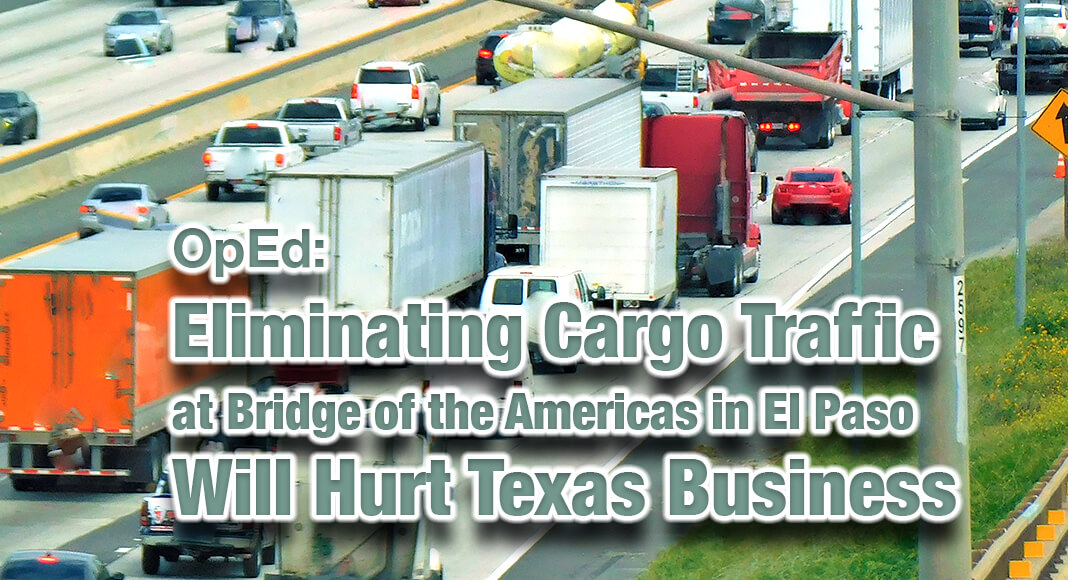
Texas Border Business
TEXAS ASSOCIAN OF BUSINESS – Ensuring efficient cargo traffic across our southern border is vital to Texas’ economic success. In the El Paso region alone, ports of entry processed nearly $100 billion in trade in 2023, which is why we are deeply concerned by a new plan announced by the US General Services Administration (GSA) to eliminate all Cargo trafficat the Bridge of the Americas (BOTA) in El Paso.
On Monday, the Texas Association of Business (TAB) – along with binational business and private sector stakeholders from Texas and Mexico, including the Texas Trucking Association (TTA), the Confederation of Industrial Chambers of Mexico (CONCAMIN) and Mexico’s National Chamber of Cargo Transportation (CANACAR) – submitted a letter to the GSA strongly opposing this premature and irresponsible decision to halt commercial traffic crossing the border at BOTA, which sees roughly 500 cargo trucks cross the bridge daily. If this short-sighted recommendation is implemented, the businesses that both operate and rely on these commercial vehicles will undoubtedly suffer, and the Texas economy will take a hit.
Importantly, GSA’s recommendation does not take into consideration the negative economic impact this action would have on both the local communities and broader binational region. Furthermore, the GSA failed to engage with the business community and other key stakeholders on both sides of the Texas-Mexico border who will be directly impacted by this ill-advised decision
As TAB and our coalition partners wrote:
“These factors make it evident that the GSA has rushed to a conclusion without having gathered all the necessary facts, data, or analyses from the communities that will be most impacted. By your own admission during your recent public meeting, GSA is still in the data collection phase and soliciting stakeholder input, yet you have already decided to recommend an option that the business community strongly opposes, which will harm vital economies on both sides of the border. In addition, stakeholders are concerned about the lack of clarity as to what traffic projection studies your team has used in their process to determine your preferred alternative, as well as the dubious accuracy of those studies. This includes a complete lack of information regarding southbound traffic and only a recent attempt to capture this data with a small sample size at one port of entry. The regional port system will be unable to adjust to the abrupt changes outlined in your recommendation until there is a comprehensive understanding of the regional traffic system, including southbound data at the affected ports of entry.”
The ongoing development of critical infrastructure to support the growing cross-border commerce between Texas and Mexico, our top trading partner, is essential for the economic prosperity of our state. According to the Maquiladora Association of Juarez, over 300 foreign companies operate export factories in Juarez, Mexico, employing more than 313,000 people, with 95% of Juarez’s exports destined for the U.S. market via El Paso.
Manuel Sotelo, Vice President of the Juarez chapter of Mexico’s National Chamber of Freight Transport (Canacar), says the closure of the bridge will have “catastrophic” economic repercussions for Texas and the U.S., telling FreightWaves:
“It would definitely be catastrophic if they were to limit cargo through the Bridge of the Americas.”
If GSA’s recommended plan moves forward, commercial traffic across BOTA would shift to the Ysleta-Zaragoza International Bridge, which maintains a bridge toll rate for cargo trucks of $9 for a vehicle with five axles, plus $4.50 for each additional axle. With over 500 cargo trucks using the BOTA per day, the President of Canacintra Juarez Ysela Molina anticipates a costly economic impact:
“These companies would face significant losses due to the additional cost of diverting shipments, estimating between $120 and $180 per shipment.”
El Paso Mayor Oscar Leeser has likewise expressed concern over this pending decision, telling local media:
“I would be very concerned that if we did close freight there, we may lose some of the business and some of the economic impact this has for the city.”
Past state-level efforts to address border security, like enhanced inspections on international ports of entry across the Texas-Mexico border, were met with concern from members of the business community. It’s important to note that these were only temporary measures that resulted in traffic bottlenecks, whereas the GSA’s recommended approach toward eliminating cargo traffic BOTA would be permanent, inflicting wide-ranging and long-lasting harm on business communities on both sides of the border.
We are proud to stand alongside the business communities in Texas and Mexico, united in opposition to the elimination of cargo traffic at BOTA. We hope that the GSA’s leadership under the incoming Trump-Vance administration will withdraw the agency’s recommendation and fully consider all relevant facts and feedback from the stakeholders most affected by this decision. Any decision without this essential data would be a disservice to the El Paso-Juarez business community, the Texas economy, and the increasingly integrated economies of the U.S. and Mexico.
To read the full letter, please click here.
-Glenn Hamer, President & CEO, Texas Association of Business

















